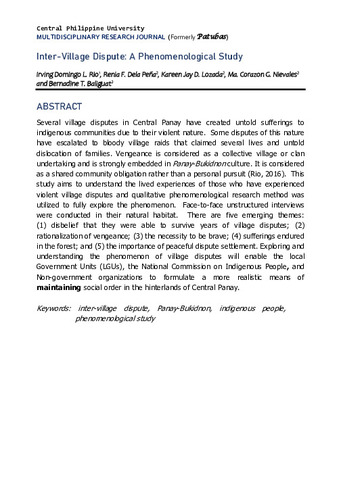Inter-village dispute: A phenomenological study
Abstract
Several village disputes in Central Panay have created untold sufferings to indigenous communities due to their violent nature. Some disputes of this nature have escalated to bloody village raids that claimed several lives and untold dislocation of families. Vengeance is considered as a collective village or clan undertaking and is strongly embedded in Panay-Bukidnon culture. It is considered as a shared community obligation rather than a personal pursuit (Rio, 2016). This study aims to understand the lived experiences of those who have experienced violent village disputes and qualitative phenomenological research method was utilized to fully explore the phenomenon. Face-to-face unstructured interviews were conducted in their natural habitat. There are five emerging themes: (1) disbelief that they were able to survive years of village disputes; (2) rationalization of vengeance; (3) the necessity to be brave; (4) sufferings endured in the forest; and (5) the importance of peaceful dispute settlement. Exploring and understanding the phenomenon of village disputes will enable the local Government Units (LGUs), the National Commission on Indigenous People, and Non-government organizations to formulate a more realistic means of maintaining social order in the hinterlands of Central Panay.
Description
Journal article


